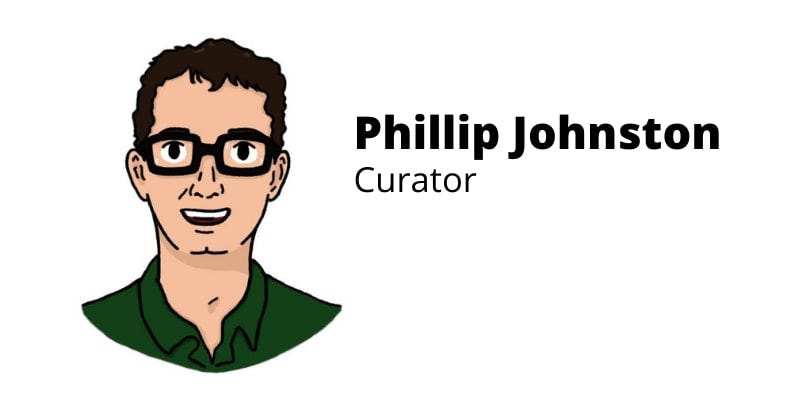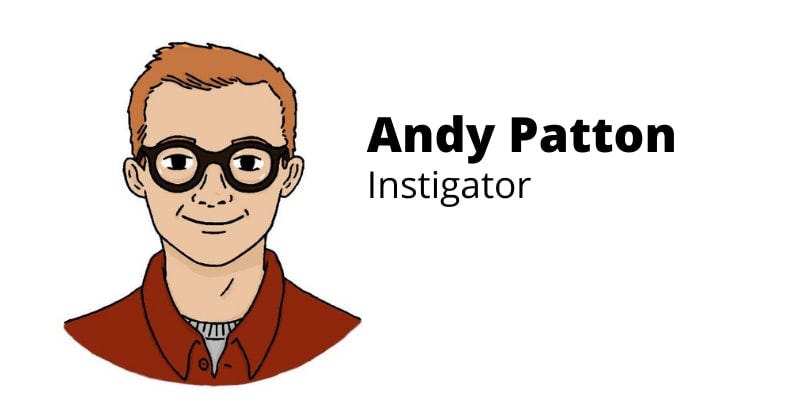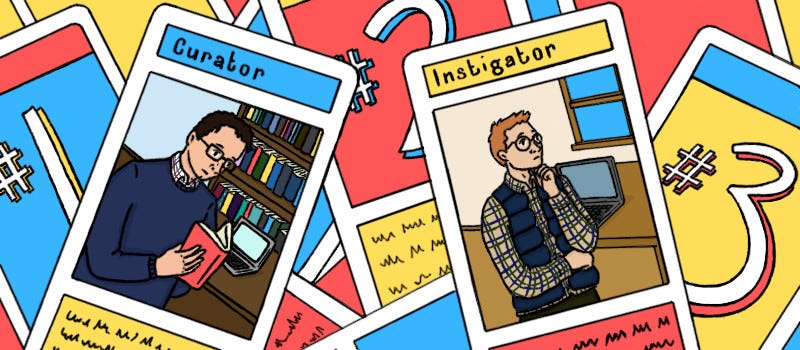Divided Brains, American Babel, and the Folly of the Cross
Plus: Farewell, Ama*on. Hello, Bookshop.org.
A quick note, faithful readers, before we jump in. Back when we started Three Things, we set up an affiliates account with a gargantuan online retailer that shall not be named. If you clicked a book title, it would take you to their website, giving you opportunity to shell out some cash to fund the billionaire space race.
For a number of reasons, this rankled your faithful curator — but no longer!
Our book links will now take you to Bookshop.org where your purchases will directly benefit independent bookshops. Happy reading!
Our Brains, Our Delusions, and the Unmaking of the World
Iain McGilchrist on The Matter with Things
Around thirteen years ago, psychiatrist Iain McGilchrist wrote a big book on the divided brain. It wasn’t about how the left brain does reason and the right brain does emotion, a popular myth that has now been debunked. Rather, McGilchrist showed how the smaller left hemisphere has a narrow focus on detail, while the larger right hemisphere is focused on the bigger picture. So, while the left brain separates things into parts, the right seeks connection and integration. The left is either/or, the right is both/and. The left brain looks at the world and says “How can I use this?”. The right brain asks “How can I become part of this?”.
The two hemispheres are meant for cooperation, but the right hemisphere is longer, wider, larger and heavier. It is the master. But the story of Western culture, as McGilchrist tells it, is the story of the master’s enslavement to its emissary, the left hemisphere. (Click here for an animated version of this argument.)
McGilchrist has now taken the story further with The Matter with Things, a massive two-volume work that looks at how humanity addresses the big questions: Who are we? What is the world? Do we have a purpose?
With the emissary in the driver’s seat, our only source for answers are science and reason. But a truly integrated brain would use intuition and imagination just as much, if not more.
Very few people will (or can) read a book like this, so interviews like the one above are very important. In this one, McGilchrist covers:
How do the two brain hemispheres work together in helping us understand and navigate the world? [07:36]
How is science limited in our understanding of the world? Why is there a need to acknowledge these limitations? [28:46]
How are the four pathways of understanding – science, reason, intuition & imagination – related? [32:38]
What is intuition? Why is there a notion that intuition is unreliable? [38:01]
What is imagination? How does it differ from fantasy? [44:54]
Why do we know less and live worse than the people before us? [01:02:32]
How does understanding the hemispheres and the different modes of knowledge apply practically in our lives? [01:24:50]
Check out the interview above or listen to it over at MetaLearn. McGilchrist isn’t a Christian and this isn’t an endorsement of all his views. However, the integration he points us to is an important task for churches and individual Christians.
Why the Past 10 Years of American Life Have Been Uniquely Stupid
Jonathan Haidt on social media, trust and the Tower of Babel
To understand just what in the world has happened to America in the past ten years, renowned social psychologist Jonathan Haidt has gone to the Bible. His narrative of choice comes from Genesis 11, the story of the tower of Babel. Haidt’s masterfully distilled, yet detailed account goes like this:
Our Babel’s foundations were laid throughout the twentieth century, the internet, social media and smartphones being key players.
The tower began climbing in 2011, ”a year that began with the Arab Spring and ended with the global Occupy movement”. As Haidt puts it, “We were closer than we had ever been to being ‘one people,’ and we had effectively overcome the curse of division by language. For techno-democratic optimists, it seemed to be only the beginning of what humanity could do.”
The confusion of languages transpired because of the many changes wrought by and within social media platforms. The toxic combination of “a naive conception of human psychology, little understanding of the intricacy of institutions, and no concern for external costs imposed on society” gradually began to erode the three things that make democracies thrive: high trust, strong institutions and shared stories.
The tower fell between 2011 and 2015, a period that saw both the rise of Donald Trump and “ the great awokening”. Both political parties were gradually stupefied from within.
In our post-Babel culture, “the dart guns of social media” empower trolls and silence good citizens, give more power and voice to political extremes, and deputize all users to administer justice with no due process. In America (and across the West), institutions have become “stupider en masse because social media instilled in their members a chronic fear of getting darted.”
Read Why the Past 10 Years of American Life Have Been Uniquely Stupid for the whole story and to see Haidt’s three suggestions for what needs to change. And if you haven’t read his book The Righteous Mind — well, what are you waiting for?
The Mystery of Being Human in a Dehumanizing World
Joshua Heavin on the scandal of the cross
It is Holy Week, a time set aside by Christians throughout the world for meditation on the sacrifice of Christ. In this article, theologian Joshua Heavin takes us to the center of that sacrifice via a unique starting point: the problem of human dignity.
We live in a dehumanizing world that has no real place for “the lonely elderly, ethnic minorities, the supposedly unproductive, and especially those human beings with physical or intellectual disabilities”, but a Christian view of the world announces their inherent dignity. Why?
Because all human beings are made in the image of God. Jesus Christ is the image of God par excellence (Colossians 1:15). Press deeper and we find that a truly Christian view of our humanity must maintain “that the saving wisdom and power of God are revealed in the folly and weakness of a crucified Messiah”. This is scandalous:
…whatever true human needs are, human beings do not want a crucified Messiah. A Messiah who lives gently in a violent world is so utterly damning a contradiction of our obsessions with power, wealth, reputation, and pleasure that he must be eliminated. A Lord who takes little children by the hand and blesses them represents a threat. Who will rid us of this monster, who embraces the people we throw away, who takes in his arms these repulsive, embarrassing, ridiculous folks? Where popularity and wealth determine human wealth, only scorn is deserved by someone so weak as to befriend unimpressive, annoying, inconvenient, resource-draining persons, wasting everyone’s time by eating with the disreputable and disenfranchised, wrapping a towel around his waist and filling a basin with water to wash their disgusting feet. Or, when human worth is functionally a matter of physical attractiveness, then the suggestion that a crucified Nazarene is the image of the invisible God represents not merely a strange shortcoming but a scandal which challenges the entire world…
Where would this challenge lead if we embraced it? “Open-hearted tenderness to vulnerable children, attentiveness towards persons with disabilities, or marveling with the wonder at the gift of the earth…”
Read The Mystery of Being Human in a Dehumanizing World over at Mere Orthodoxy.
Phillip and Christa celebrated four years of marriage last week and went out to lunch — drum roll, please — without the baby. How novel! Venue was the restaurant portion of a spot where Phillip sometimes camps out to work, often within sightline of a massive display glorious of dry aged steaks. The wait is over.
Reading: While writing a recent sermon, Phillip made his annual return to Heaven: The Heart’s Deepest Longing, Peter Kreeft’s sparkling unfurling of C.S. Lewis, George MacDonald, Augustine, and Thomas Aquinas on heaven, eternity, happiness and joy. Quite humbling to see what is underlined, as well as what is not underlined, from the first reading ten years ago. It is a fathomless book that Phillip looks forward to returning to throughout the undulations of life. He’s also started Kelly Kapic’s You're Only Human: How Your Limits Reflect God's Design and Why That's Good News.
Watching and listening: Phillip wrote about Petite Maman for this month’s Evangelicals Now, a beautiful film he has now had the pleasure of watching three times. This Holy Week playlist from Art&Theology.org is also introducing him to some gems. Eastertide is in the queue for next week: “Classical, gospel, choral, folk, and indie-pop music selections for the fifty-day feast of Easter (aka Pascha), celebrating the resurrection of Jesus Christ and all its glorious implications.”
Andy’s earthly possessions finally arrived from the shipping container from their seven-month-long hiatus in Shipping Crisis Hell. He is happy to be reconnected with his books, mugs, and Gandalf pipe at last.
Reading: Andy has been returning to the poetry of Gerard Manley Hopkins lately. It has been said that you should read all poems twice, but Hopkins’ poems twelve times, and in Andy’s experience that has largely proven true. But wow… when they get inside you on that twelfth time, they produce a crop one hundredfold. If you’re new to Hopkins, read The Gospel in Gerard Manley Hopkins.
Listening: Anaïs Mitchell’s poignant and wise new self-titled album. Listen to “Real World,” especially.
Darkling Psalter: (Andy’s Psalm commentary, translation, and poetry project) Psalm 107 “Chrysalis and Crucifixion.”












